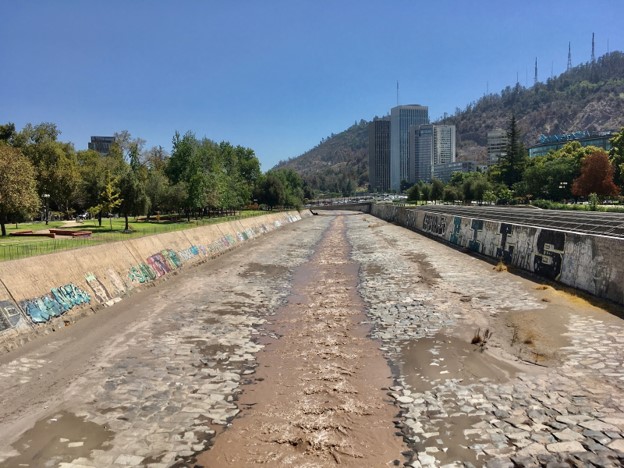Not everyone has the privilege to wash the hands: Covid–19 and unequal access to water in Latin America
By Anna Heikkinen

Santiago de Chile, February 2020. Chile is experiencing a severe mega drought for the tenth consecutive year. Marginalized urban neighborhoods across Latin American megacities are extremely vulnerable in front of Covid-19 as water scarcity deepens. Photo: Anna Heikkinen
Water has become a vital weapon in the battle against coronavirus. Since the prorogation of Covid-19, the World Health Organization (WHO) announced “washing your hands frequently” as a principal protective measure to slow down the transmission. Unicef further instructed to wash the hands throughout under running water with soap for at least 20 seconds – the time it takes to sing “Happy Birthday” twice. Social media feeds soon went viral on videos of singing people, obeying their civic duty to prevent the spread of coronavirus.
Meanwhile in Latin America many people have been asking – how to follow these protective measures if there is no water?
According to Inter-American Development Bank (BID), 34 million people in Latin America and the Caribbean lack access to potable water and 106 million have deficiencies in basic sanitation. In 2017, the countries with major pitfalls in basic sanitation were Bolivia, Brazil, Colombia, Haiti, Mexico, Peru and Venezuela.
The conditions to follow hygiene are not equal for everyone even within the countries in Latin America and the Caribbean. A UN/WHO joint program report shows that there is a deep gap between basic drinking water services and sanitation between urban and rural regions. In 2015, 68% of the rural population lacked safely managed sanitation and 75% had deficient potable water services. Moreover, poor urban neighborhoods in Latin American megacities often suffer from severe difficulties in access to adequate quality and quantity of water.
In Peru’s capital of Lima, 700,000 people living in the poorest regions of the city are facing the coronavirus without proper access to clean water. In the absence of municipal water services, residents of the peripheral districts must buy water from tank trucks. The cost of tanked water per cubic meter can be up to ten times higher than in the wealthier parts of the city connected to the municipal water network. In January 2020, the investigative journalism platform, Ojo-Público, ordered a quality analysis of tanked water in one of the remote districts of Lima. The analysis revealed high quantities of fecal bacteria, lead and other substances posing risks for health.
Besides water pollution, climate change is posing further pressure on water supplies in Latin America. Prolonged droughts and other extreme weather events have become more common, deepening water scarcities in many parts of the continent. In the middle of the coronavirus crisis, Mexico announced a state of emergency due to extreme droughts. Meanwhile Chile is struggling with mega droughts for the tenth year in a row. Currently in Mexico over 10 million and in Chile thousands of households lack daily access to potable water. Rural and poor urban populations and indigenous people are in the most vulnerable position in losing access to clean water as the droughts intensify.
While climate change is aggravating water scarcity across Latin America amidst coronavirus, the roots of the problem lie elsewhere. In many Latin American countries water is distributed highly unequally between different sectors and groups of society. Water use is often prioritized for economically productive activities such as extractive industries, export agriculture and forestry or prosperous urban neighborhoods. This means that during crises like climate change or coronapandemic, there will always be water for those who can afford to pay for it.
Latin America is one of the most unequal regions in the world. The income gaps and access to basic services between different groups of people are steep. Covid-19, together with climate change, have shed light on these deeply rooted inequalities, including unequal access to water. Now for many, luxuries such as following the hygienic guidelines of washing the hands to prevent spread of infectious diseases, are out of research. Without thinking of new ways for more just and equal water management – the coronavirus risks leaving Latin America with an even more profound water crisis.
Bio: Anna Heikkinen is a doctoral researcher in Development Studies at the University of Helsinki. Her current research focuses on water governance, climate vulnerabilities and socio-environmental conflicts in Peru.